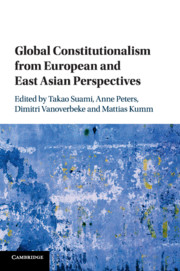Book contents
- Global Constitutionalism from European and East Asian Perspectives
- Global Constitutionalism from European and East Asian Perspectives
- Copyright page
- Contents
- Contributors
- Acknowledgments
- Global Constitutionalism from European and East Asian Perspectives
- Part I Groundwork
- Part II Pursuit of Common Values
- Part III Horizontal Interactions
- Part IV Implementation and Enforcement
- 14 The Emerging Principle of Functional Complementarity for Coordination Among National and International Jurisdictions
- 15 Human Rights NGOs and Global Constitutionalism from a Chinese Academic Perspective
- 16 Global Constitutionalism and Private Governance: The Discrete Contribution of Voluntary Sustainability Standards
- 17 International Courts and Tribunals and the Rule of Law in Asia
- Part V Conclusion: East Asia and Global Constitutionalism
- Index
14 - The Emerging Principle of Functional Complementarity for Coordination Among National and International Jurisdictions
Intellectual Hegemony and Heterogeneous World
from Part IV - Implementation and Enforcement
Published online by Cambridge University Press: 09 November 2018
- Global Constitutionalism from European and East Asian Perspectives
- Global Constitutionalism from European and East Asian Perspectives
- Copyright page
- Contents
- Contributors
- Acknowledgments
- Global Constitutionalism from European and East Asian Perspectives
- Part I Groundwork
- Part II Pursuit of Common Values
- Part III Horizontal Interactions
- Part IV Implementation and Enforcement
- 14 The Emerging Principle of Functional Complementarity for Coordination Among National and International Jurisdictions
- 15 Human Rights NGOs and Global Constitutionalism from a Chinese Academic Perspective
- 16 Global Constitutionalism and Private Governance: The Discrete Contribution of Voluntary Sustainability Standards
- 17 International Courts and Tribunals and the Rule of Law in Asia
- Part V Conclusion: East Asia and Global Constitutionalism
- Index
Summary
- Type
- Chapter
- Information
- Publisher: Cambridge University PressPrint publication year: 2018



